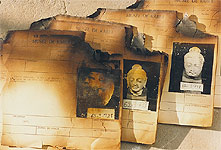
|
|
|
| |
|
|
|
|
|
|
General Objective :
to increase the knowledge about Afghanistan's cultural heritage.
SPACH HISTORY [By
Brendan Cassar. April, 2004]
Established in 1994 by a group
of concerned individuals in response to the growing awareness
of the vulnerability of the cultural heritage of Afghanistan,
SPACH works to promote cultural heritage as an integral part
of the overall reconstruction effort. SPACH is working in
partnership with the Afghan community to raise awareness of
the central importance of cultural heritage for this generation
and for those to follow, and the significant role that Afghan
heritage can play in building peace.
Since the outbreak of war in 1979, major historical
monuments, artifacts and archaeological sites across the country
have been threatened by fighting, looting and neglect. This
threat became acute in 1992 with the looting and destruction
of the Kabul Museum and culminated in 2001 when the international
community witnessed the destruction of the Buddhas of Bamiyan.
Notwithstanding the significance of these events, the danger
to Afghanistan's cultural heritage has grown steadily over
the past few years, as evidenced by an increase in the looting
and destruction of important sites in virtually every province
of the country.
Read more...
 |
 |
 |
|
| Visit to the Museum after
its looting (1994)© C. Bellau |
Upper floor before removal
of rubble (1993)© J. Leslie |
Burnt cards of the Museum
inventory (1993)
© J. Leslie
|
Museum
ground floor (1994) © J. Leslie
|
|
|
 |
|
,



